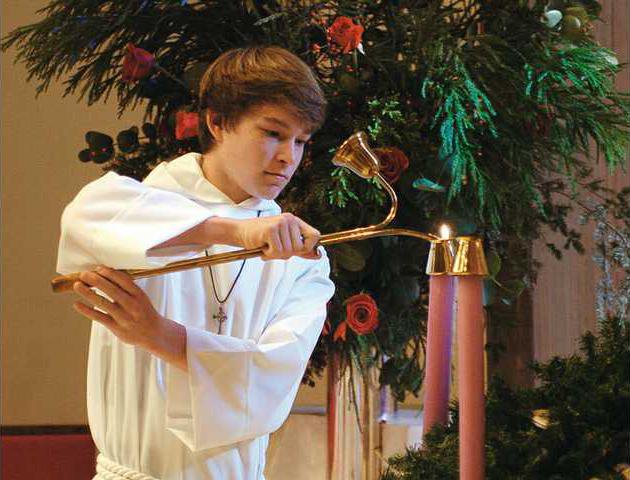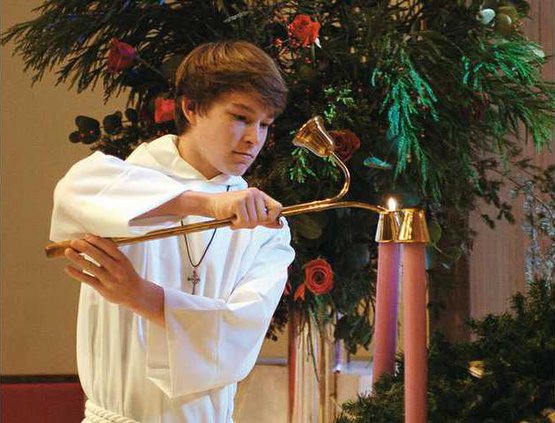1213AcolyteAUD
Mike Henry, director of music at First Presbyterian Church of Gainesville, talks about why the church decided to start using acolytes.To get the youth more involved in the worship service, First Presbyterian Church of Gainesville came up with the idea to let them serve as acolytes.
"They serve in participation in choir, youth group and mission trips, but this is another opportunity for service on a regular basis," said Mike Henry, the director of music at First Presbyterian. "The real meaning of the word acolyte is helper."
At First Presbyterian, three youths assist as acolytes; one carries the cross, one carries the Bible and the third lights the candles during a procession each week at the start of the 11 a.m. service.
"Acolytes in different faith traditions serve in slightly different ways," Henry said. "In some traditions they actually assist ministers or priests in the serving of communion. We actually don't have them in that function here - we have them lighting candles and someone bearing the Bible into the sanctuary and a crucifer.
"The one that carries the cross is actually leading the procession of the choir and ministers at the start of worship. It lends an air of dignity to worship, but through the acolytes it also gives the young people an avenue to serve."
The church began the acolyte program about a year ago and since then there have been about 45 youth who participated, according to Dotti Rigby, acolyte coordinator at First Presbyterian.
"We got started with the acolyte guild down at Buford First Presbyterian," Henry said. "It's really part of our overall youth ministry; we viewed it as an opportunity for our youth to serve."
That dedication made to the church is exactly why Hannah Fulenwider got involved in the acolyte program.
"I really like it because it makes me feel like the service is starting and it makes it seem more real," she said.
Fulenwider, a member at First Presbyterian, said when she serves as an acolyte she arrives at the church a few minutes before the service begins and during this time she gets prepared. She puts on a white robe called an alb, a sash and a cross.
"We go down when the prelude starts and one person lights two candles - well, now we light the advent candles for Christmas. And then one person carries a big metal cross, and they put it at the front of the church. And one person carries the Bible and puts it in front," Fulenwider said.
Fulenwider is set to perform her acolyte duties Sunday, but during last week's service, Kelsey Maine, 17, and Evan Maine, 15, along with Andrew Todd served in the roles.
"Well, I really like it because it's a good way to appreciate tradition ... really good to be a steward," Kelsey said.
"They have to make a commitment in doing it because it's like any other volunteer job," Rigby said. "The person that carries the cross is the crucifer, and the meaning of the cross obviously represents the church. And then the Bible and the candles are just part of our service. ... The Bible and candle are placed on the communion table."
According to Henry, the crucifer is a "Celtic processional cross because of the Celtic and Scottish roots."
Kate Maine, longtime member at First Presbyterian and mother of Kelsey and Evan, said she thinks letting her children serve as acolytes is just another way for them to worship.
"Both of our children have grown up in that church, so it's very important for them," she said. "I think to participate in worship actively ... I think it's very fulfilling."
Even though Kelsey and Evan are very serious about their acolyte service, Kelsey admits that "me and my brother argue over who gets to light the candles."
Maine added that since the acolytes have been a part of the service, she thinks it gives the church a more traditional feel and an "air of reverence."
"Really, I'm sure it goes back to their (acolyte) use in the Roman Catholic church," Henry said. "You find universally in Catholic and Lutheran churches and Episcopal churches and Methodist ... Its acceptance has spread to other faith traditions, too. You don't see it in all Presbyterian churches, but you certainly do."




